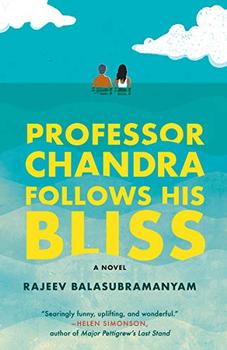Summary | Excerpt | Reviews | Beyond the Book | Readalikes | Genres & Themes | Author Bio

"Oh, de rien, de rien," he said, wishing he could stop speaking French, a language he had no knowledge of at all. "Laissez-faire."
Before the journalists left he assured them he was delighted for the winners and was glad it was all over and was looking forward to seeing them again next year. His performance fooled everyone except for Jasmine who for the rest of the morning repeated the same sentence with a seventeen-year-old's mercilessness, asking, "Are you all right, Dad? Are you all right?" keeping at it no matter what he said until finally, on the way to the airport, he lost his temper and shouted, "Can't you see I'm fine?"
In the past he would have assumed Jasmine's inquisition was motivated only by sweetness and concern, but now Chandra was convinced there was malice involved, that Jasmine had finally entered into the family tradition of torturing the patriarch, if this was what he still was, for she was a teenager now and lived with her mother in Boulder who blamed him not only for the divorce, three years old now, but also for the rise of Ebola and Boko Haram.
As soon as he reached home the phone began to ring with a stream of condolence calls that continued throughout the day and then, more sporadically, for the rest of the week. For the following month people he barely knew stopped him in the street to offer their sympathies, men and women who couldn't have named three economists had their lives depended on it.
By November the hysteria had died down, replaced by horror at the U.S. election, and it was then that Chandra realized, in all probability, he would never win the prize now. The odds had gone down a decade before when the Bengali had worked his unctuous charm, but even if time enough elapsed for another Indian to win, the field had changed. For years economists had wantonly obscured their profession, rendering everything absurdly technical with incompressible logarithms such that they were treated more like mystic seers than social scientists. Economics was little more than a poor man's mathematics now, but Chandra still struggled with calculus, considering it beneath him, a task for a penniless research assistant.
In any case, his slide to the right was hardly something the Scandinavians were likely to reward; that sub-subcontinent of mediocrity would consider it a signal of intellectual and moral deviance. It was what Chandra loathed most about liberals—their shameless self-righteousness, as if the species' failings were always someone else's fault, while anything they did, murder and arson included, were heroic acts in the service of liberty and justice. In point of fact, the Swedes weren't even liberals. They were neutrals, abstainers who behaved as if they had deliberately chosen not to become a superpower in the interests of preserving their objectivity.
Chandra wished he had just one Swedish student he could torment mercilessly, but the closest thing was a Dutch girl with an American accent who was, regrettably, quite bright. And so he went on giving his lectures and affecting the appearance of a man too wrapped up in his own research to notice that such a petty and trivial thing as the Nobel Prize even existed.
Excerpted from Professor Chandra Follows His Bliss by Rajeev Balasubramanyam. Copyright © 2019 by Rajeev Balasubramanyam. All rights reserved. No part of this excerpt may be reproduced or reprinted without permission in writing from the publisher.
Your guide toexceptional books
BookBrowse seeks out and recommends the best in contemporary fiction and nonfiction—books that not only engage and entertain but also deepen our understanding of ourselves and the world around us.